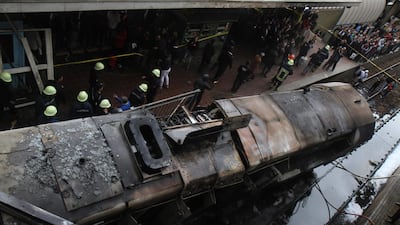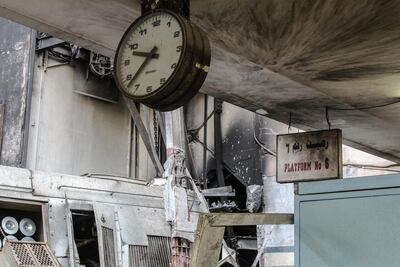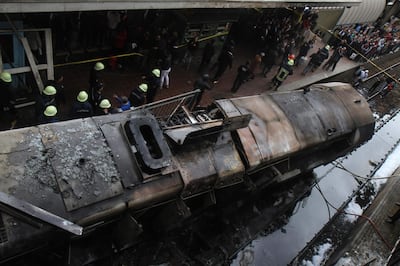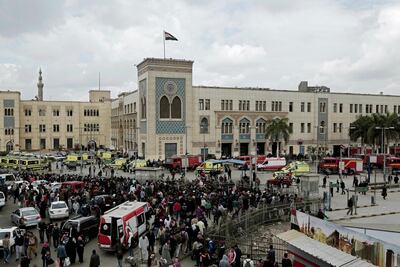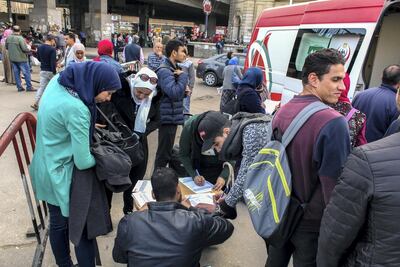The families waited until late into Wednesday night, standing in front of the Zeinhom Morgue in Cairo’s working-class neighbourhood of Sayda Zeinab waiting for the bodies to be identified.
On Wednesday morning, a runaway train car loaded with fuel slammed into platform 6 of Cairo's main Ramses rail station, causing an explosion that killed 25 people and injured 47 others.
As people loudly recited passages of the Quran, women and children wept. Marina Samy had tears streaming down her face and visibly trembled as she approached the morgue. She was hoping to find the body of her mother, Ivon Ayyad, who worked at the station and had been missing since the explosion.
She said that the family had checked the lists of the injured for her mother’s name, and roamed the city’s hospitals and morgues hoping to find her. After hours of back and forth with officials at the Zeinhom Morgue, she and her uncle were allowed to enter. There they found Ayyad, who died from traumatic injuries suffered in the blast.
Samy and her family were far from alone as dozens of relatives tried desperately to find out the fate of their loved ones.
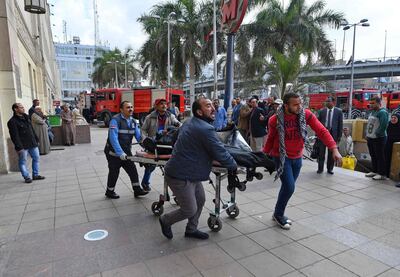
William had travelled to the capital from Aswan in southern Egypt to try and find his friend, dentist Beshoy Fathy, who he knew had been at the station shortly before the blast.
"He arrived in the morning and we heard about the incident, but his phone was off," William told The National. "We looked everywhere until they told us that all the bodies would be sent to Zeinhom[morgue]."
William collapsed as he said he had just informed Fathy’s family that he had identified his friend's body.
Fathy, in his early 20s, had been engaged, William added. The young couple were planning to get married in the coming months.
Others hoped to find their relatives in the list of the injured.
Marwa Shaban stood outside the chaotic emergency entrance to the Al Helal Hospital, less than 2 kilometres from the station.
Several of her family members were still missing.
In the wake of the blast, Al Helal Hospital was overwhelmed as the dozens of injured people were brought in, many with severe burns. Hospital staff working on the reception desk moved between the doctors, trying to calm and reassure the families of the victims.
"They were supposed to take one of the earlier trains to go to Alexandria to attend a relative's wedding," Marwa told The National as she wandered the hospital trying to avoid the pools of blood across the tiled floor.
“We [have] found two of our relatives who were injured so far,” she said, adding that they had confirmed her young niece was dead. “We are still looking for the rest.”
Egypt’s prosecutor announced late on Wednesday that the incident had been caused when an argument led the train driver to step down from the cab. He forgot to engage the breaks or shut off the engine. The train continued to move, gathering speed and slamming into the platform causing the huge fireball that scattered people and belongings in all directions.
“The fire was so huge that most of the victims’ bodies were severely burned,” the prosecutor said in a statement.
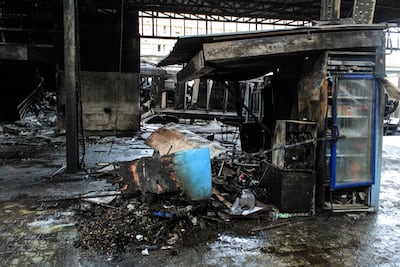
In a televised interview on the privately owned ONTV, the driver of the crashed locomotive, Alaa Fathy, gave his account.
“I was going to park the train and another locomotive ran into me. We [the drivers] both got out and started arguing. I wish I had shut the engine off before I got out but the locomotive started to move until it crashed,” he said.
Addressing the families of the victims directly, he said asked for forgiveness. “I am sorry for my negligence, it was not my intention. … May god aid the injured and their families and god bless the dead."
On Wednesday afternoon, commuters passed through the partially operating Cairo station. Although trains still arrived and departed, dozens were delayed. The station’s entrance to the Ramses Metro Station, a central spoke in a network that transports millions of Egyptians every day, was closed.
Inside the station cleaners slowly collected dozens of bags belonging to the victims or witnesses who escaped the blast. Above a pile of bags, the station clock that hangs above platform six had stopped. The time still showed the moment of the blast, 9:37.
Attia, a 28-year old pharmacist, was on his way to Minya 250 kilometres south of Cairo for a holiday when the blast ripped through the station. He told The National that the fire rose very quick, taking everyone by surprise.
“I arrived early and was having breakfast when we saw the blaze,” he said. “People used water, small fire extinguishers and blankets to help people. Some men even took off their jalabiyas to put off the fire.
“But the fire was so strong, some victims we couldn’t get away from the blaze. They died right in front of our eyes.”
Mossab Al Sweedy, a cafeteria waiter who witnessed the fire, told The National that he heard people yelling "there are no brakes, there are no brakes".
Seconds later, the locomotive ran into the platform.
“The people who were in the waiting area for the 2nd class train which travels to Alexandria were all gone. There were children and women among them,” he said.
“People were running like crazy. It will sound strange, but thank God the accident didn’t take place earlier in rush hour or the deaths would have been in the hundreds.”
Mr Al Sweedy, who has worked at the station for 12 years, said he assisted the paramedics carrying the bodies to the ambulances. He said the government must look into developing safety measures in the station.
As well as the families frantically looking for their loved ones, residents from across Cairo turned up at hospitals across the capital in their hundreds to donate blood.
Mohamed Atef, an accountant at a finance company, told The National that as soon as he heard that there was a shortage for the wounded, he rushed to the nearest hospital to donate.
Ambulances parked in Ramses Square in front of the train station accepted donations from hundreds more.
“We ran out of the blood donations application forms,” said Mohamed Tarek, a paramedic in one of the street-based ambulances in Ramses Square.
